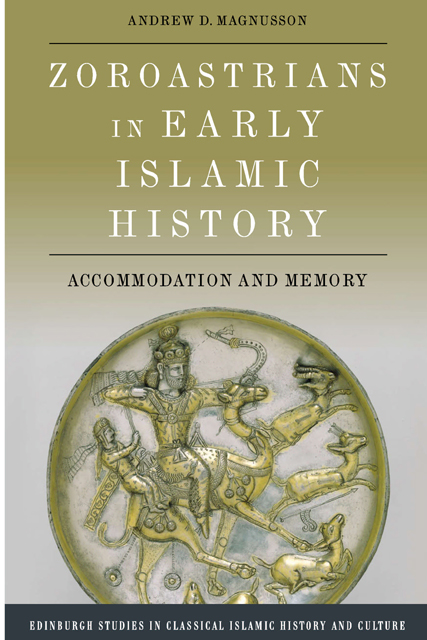Book contents
- Frontmatter
- Contents
- Acknowledgements
- A Note on Transliteration and Abbreviation
- Dedication
- Introduction: Zoroastrianism, Islam and Accommodation
- 1 Myth and Countermyth in Zoroastrian Historiography
- 2 Umar’s Dilemma: The Taxation of People Without a Book
- 3 Marriage, Meat and the Limits of Accommodation
- 4 Salman’s Charter as a Site of Memory
- 5 Fire Temple Desecration and Triumphal Tales of Violence
- 6 Rhetorical Zoroastrians in Early Islamic Discourse
- Conclusion: An Ambivalent Accommodation
- Appendix A Translation of an Iranian Recension of Salman’s Charter
- Appendix B Translation of an Indian Recension of Salman’s Charter
- Bibliography
- Index
Introduction: Zoroastrianism, Islam and Accommodation
Published online by Cambridge University Press: 25 April 2023
- Frontmatter
- Contents
- Acknowledgements
- A Note on Transliteration and Abbreviation
- Dedication
- Introduction: Zoroastrianism, Islam and Accommodation
- 1 Myth and Countermyth in Zoroastrian Historiography
- 2 Umar’s Dilemma: The Taxation of People Without a Book
- 3 Marriage, Meat and the Limits of Accommodation
- 4 Salman’s Charter as a Site of Memory
- 5 Fire Temple Desecration and Triumphal Tales of Violence
- 6 Rhetorical Zoroastrians in Early Islamic Discourse
- Conclusion: An Ambivalent Accommodation
- Appendix A Translation of an Iranian Recension of Salman’s Charter
- Appendix B Translation of an Indian Recension of Salman’s Charter
- Bibliography
- Index
Summary
Zoroastrianism, Islam and Accommodation
In the seventh century, when Zoroastrians first met Muslims, the end of the world seemed nigh. According to later Zoroastrian sources, demons of wrath pillaged Iran and dishevelled devils ruled in wickedness. Arabs destroyed ancient customs, imposed evil laws and consumed polluted matter. Zoroastrians awaited the arrival of the legendary heroes who would deliver them and the saviour who would ultimately purify the earth. In other words, Zoroastrians imagined their first encounter with Muslims apocalyptically. Muslim narrators remembered it differently. When the caliph Umar ibn al-Khattab (ruled 13–23 ah/634–644 ce) first heard about Zoroastrians he was perplexed. Umar reportedly exclaimed, ‘I do not know how to treat Zoroastrians!’ It was an exasperated acknowledgement that they did not fit neatly into his religious paradigm. Umar’s confusion about Zoroastrians, the struggle to accommodate them in the early caliphates and the ambivalence felt by subsequent generations of Muslims is the subject of this book.
Zoroastrianism in Late Antiquity
In order to appreciate the significance of this interreligious encounter, it is important to understand the nature of Late Antique Zoroastrianism. Under the Sasanian dynasty (224–651 ce) of Persia, Zoroastrianism became an imperial religion. The faith of individual emperors in the Achaemenid (550–330 bce) and the Arsacid or Parthian (247 bce–224 ce) periods, Zoroastrianism gained official status in the third century when Ardashir I, the founder of the Sasanian dynasty, sought an ideology to legitimise his rule. Scholars have recently questioned how exclusive the empire’s relationship was with Zoroastrianism, especially early in its history. Sasanian subjects practiced a variety of faiths, from Judaism and Christianity to Manichaeism, and their communal leaders were often present at court. Yet the Zoroastrian priestly sources from the period, while certainly not disinterested, suggest that Sasanian monarchs had more than a personal interest in Zoroastrianism. That religion enjoyed a privileged status in the empire.
Most Zoroastrians recognised Ahura Mazda, the Wise Lord, as the creator of order, light and purity. Ahura Mazda, also known as Ohrmazd in Pahlavi sources, was engaged in a cosmic struggle against Ahriman (or Angra Mainyu, ‘the Evil Spirit’ in the Avestan language), the sower of chaos, darkness and pollution. Zoroastrians believe that Ahura Mazda will eventually triumph and a defiled earth will be restored to its paradisiacal state. Zoroastrian cosmology also includes Amesha Spentas – seven immortal beings created to assist in the struggle against Ahriman.
- Type
- Chapter
- Information
- Zoroastrians in Early Islamic HistoryAccommodation and Memory, pp. 1 - 18Publisher: Edinburgh University PressPrint publication year: 2022



